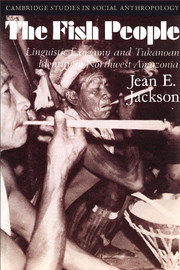Book contents
- Frontmatter
- Contents
- List of figures, maps, and tables
- Preface
- Acknowledgments
- Note on orthography
- 1 Purpose and organization of the book
- 2 Introduction to the Central Northwest Amazon
- 3 The longhouse
- 4 Economic and political life
- 5 Vaupés social structure
- 6 Kinship
- 7 Marriage
- 8 Tukanoans and Makú
- 9 The role of language and speech in Tukanoan identity
- 10 Male and female identity
- 11 Tukanoans' place in the cosmos
- 12 Tukanoans and the outside world
- 13 Conclusions: themes in Tukanoan social identity
- Notes
- Glossary
- References
- Index
- CAMBRIDGE STUDIES IN SOCIAL ANTHROPOLOGY
6 - Kinship
Published online by Cambridge University Press: 05 June 2012
- Frontmatter
- Contents
- List of figures, maps, and tables
- Preface
- Acknowledgments
- Note on orthography
- 1 Purpose and organization of the book
- 2 Introduction to the Central Northwest Amazon
- 3 The longhouse
- 4 Economic and political life
- 5 Vaupés social structure
- 6 Kinship
- 7 Marriage
- 8 Tukanoans and Makú
- 9 The role of language and speech in Tukanoan identity
- 10 Male and female identity
- 11 Tukanoans' place in the cosmos
- 12 Tukanoans and the outside world
- 13 Conclusions: themes in Tukanoan social identity
- Notes
- Glossary
- References
- Index
- CAMBRIDGE STUDIES IN SOCIAL ANTHROPOLOGY
Summary
Treating kinship as a separate topic is difficult, for it pervades every aspect of life. Tukanoans spend most of their lives with their family – their hearth family and the extended family making up the longhouse unit – and when this group is temporarily enlarged, it almost always consists of kinsmen. To a much greater extent than in more complex societies, in which people can occupy any number of nonkinship positions (e.g., “working class”; “Brahman caste”) and assume any number of nonkinship roles (e.g., doctor–patient; teacher–student), the kinship-based roles a Tukanoan plays throughout life are the primary source of social identity.
Tukanoans address and refer to one another with kin terms most of the time. The name given to each infant at the naming ceremony soon after birth is known by everyone but seldom heard. Naming illustrates temporality and relationality, two themes mentioned in Chapter 1. A Bará receives a name from a very finite list owned by the sib (see C. Hugh-Jones, 1979; Århem, 1980), and the name ideally comes from a FF (father's father) or FFZ (father's father's sister) who has recently died. The deceased's losing his or her name is another stage in the process of dying and joining the relatively undifferentiated mass of ancestor people; the taboo on mentioning the names of the dead accelerates this process.
- Type
- Chapter
- Information
- The Fish PeopleLinguistic Exogamy and Tukanoan Identity in Northwest Amazonia, pp. 105 - 123Publisher: Cambridge University PressPrint publication year: 1983



